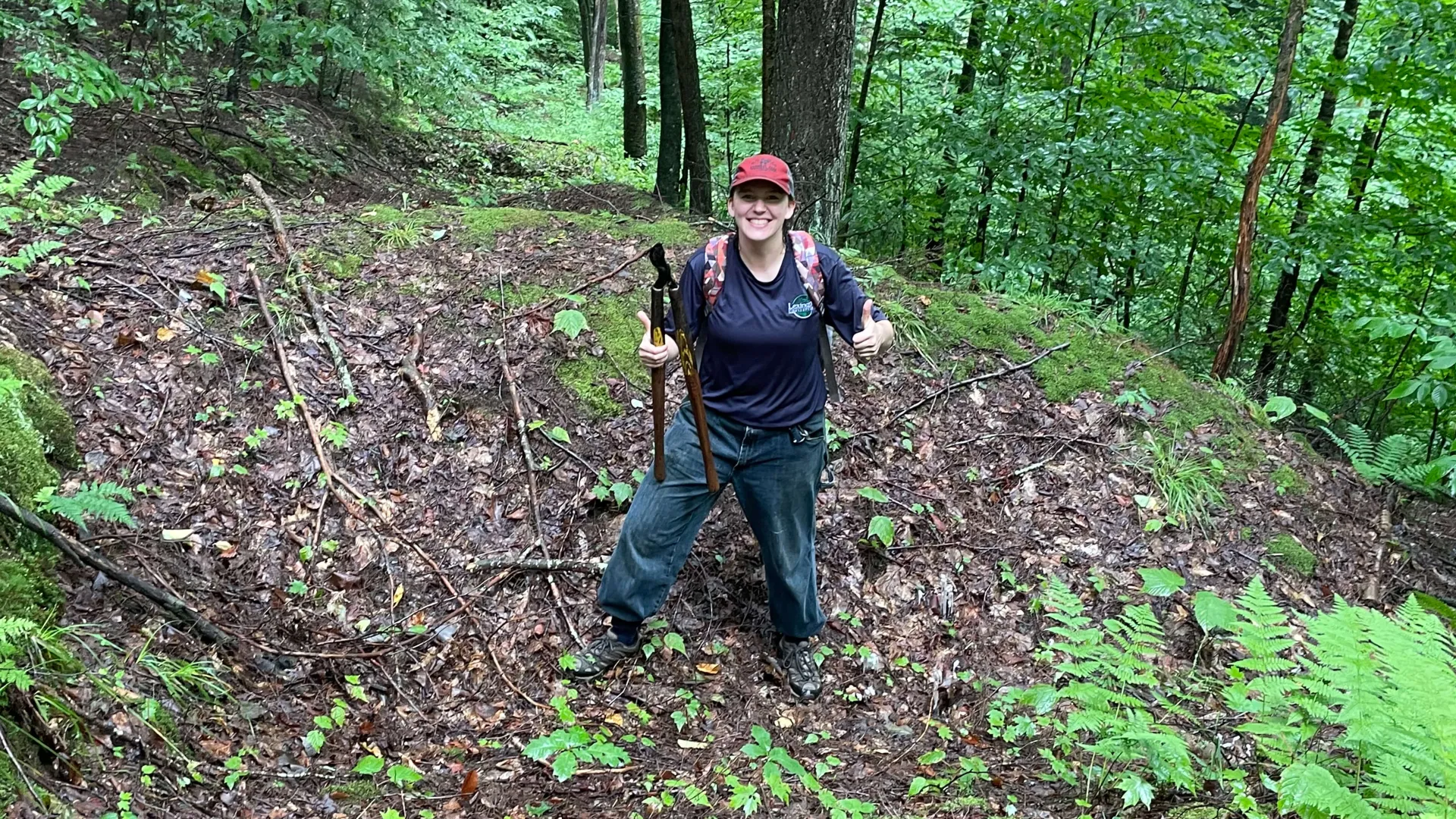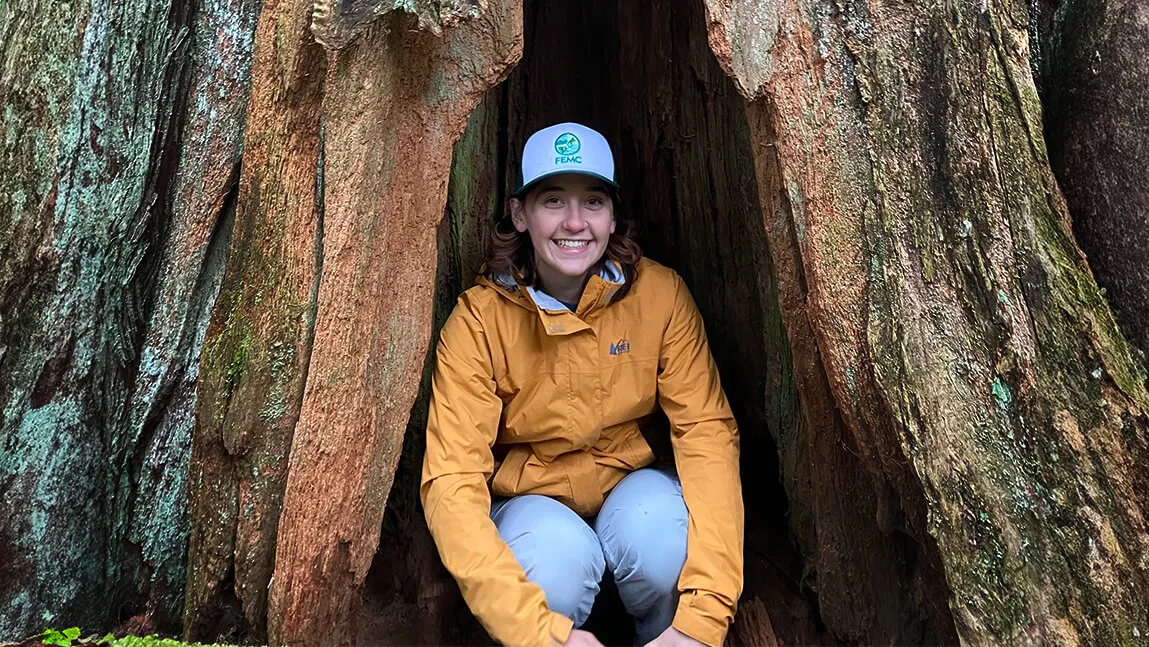For Forestry major Es Sweeney ’25, that real world situation was researching and writing a comprehensive management plan for over 100 acres of northern hardwood forest. “It was the coolest experience,” Es said. “I got the academic experience of writing the management plan, and I got to dig into the history and talk to neighbors and make decisions.”
Es took advantage of Rubenstein’s Perennial Internship program and worked as a Research Forest Steward Intern. The internship is primarily based at Jericho Research Forest, where students learn and apply a range of practical hands-on forestry and field work skills. “Sometimes in class, you learn one specific thing and you don’t get to put the pieces together as much as you’d want to,” Es explained. “The experience in Jericho really helped me put what I'd learned in perspective. It was great to see how a research forest is run.”
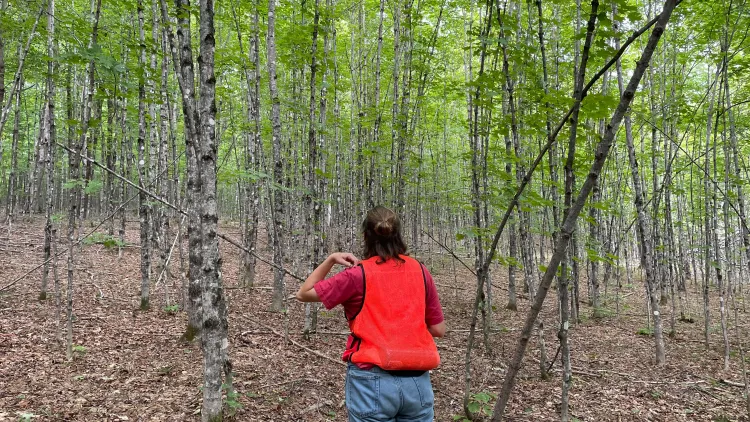
Es hit the ground running during their perennial internship, putting their skills to the test and learning new ones on day one. “We discovered beech leaf disease in Jericho right before I started my internship,” Es said. “During our first week we went out and looked for it, and at the end of the summer the Vermont State Forest Health staff came out and helped us set up transects. It was awesome to get the whole picture of everything going on in the forest and see how it all ties together, and how all the work you do, both big and small, contributes to whole forest stewardship.”
Once they had their legs out from under them, Es was tasked with developing a management plan for Washington Research Forest. This project combined various aspects of forestry knowledge and measurements, and presented Es with a chance to integrate principles learned in the classroom with techniques honed through fieldwork. “It was much more hands-on and personal than it is in class,” Es recollected. "The experience really helped me put all the pieces together."
"Es brought everything you could possibly ask for to this internship – curiosity, motivation, knowledge about forestry, and an eagerness to take on new tasks and responsibilities," said Jess Wikle, professor and manager of the UVM Research Forests. "Writing a forest management plan is a big task, but Es jumped right in and did the work of reaching out to neighbors, doing detailed data analysis and mapping, and taking the extra steps to consider the mission of the Research Forests by including opportunities for future student involvement and research projects on the parcel. I’m excited to see where Es goes in the future, and they will be a great asset to any future employer."
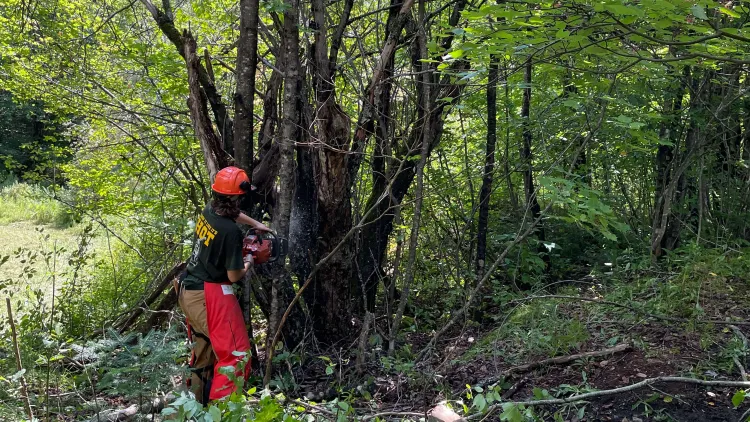
Es’s path to studying and loving Forestry was winding, yet tremendously rewarding. “In high school, I thought I wanted to study linguistics, but I’d switched from linguistics to anthropology before I even got to campus,” Es said. Es had started taking an environmental science course in high school after they’d submitted their college applications, so they were looking for programs to pivot toward where they could pursue this new academic interest. They began their UVM journey in the College of Arts and Sciences. “I switched to anthropology because I wanted to study how people related to the environment, and I thought I wanted to do urban planning.”
But during their freshman year, they joined the Timbersports team, where they met lots of forestry students. “My Timbersports friends would be telling me about their classes and what they did, and it sounded so fun and interesting,” Es explained. “I thought, ‘maybe I’ll do something crazy and switch to forestry.’” Soon they had transferred into the Rubenstein School as an Environmental Studies student and had begun taking courses that intrigued and excited them. They decided they wanted a more specific program, and made their final major switch to forestry. “I have never looked back," Es said. “It was something I didn’t even know you could do before I came to college. It wasn’t even on my radar. Once I was in it, I thought, oh my gosh, this is what I was always meant to be doing.”
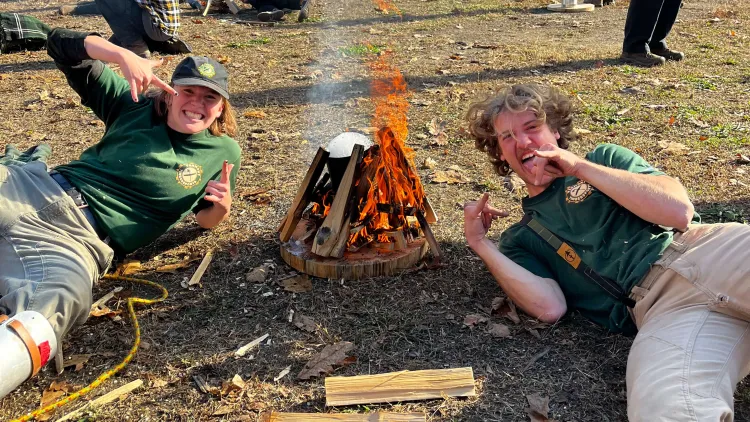
Forestry was the perfect program for Es to integrate their passion for the outdoors with their interest in how humans relate to the natural world. “Something I found really interesting about being in Vermont is that everyone knows so much more about forestry than anyone in my hometown,” Es said. “When I talk to people from Massachusetts about forestry, I’m blowing their minds when I say things like ‘actually, forest management isn’t a bad thing.’” Es found the people of Vermont to be surprisingly literate in forestry terms and concepts. “I was talking to these ladies at a church book sale in Jericho, and they were telling me all about how their forest is managed. They were so knowledgeable about it,” Es said. “Interactions like that feed into my interest in how people experience the land they live on.”
Es believes that participating in Timbersports helped them gain important skills that they use in their academic career. “Having that experience of already knowing what all the tools are, how to use them, and how to take care of them has been really helpful,” Es said. “Especially getting a crash course on chainsaws before a lot of my classmates did thanks to Timber Sports. Being on the team has given me a real appreciation for the manual labor and the physical difficulty of a lot of aspects of forestry. It’s definitely built up my strength, which has been great for jobs and given me a lot of appreciation for folks who pursue this as a career.”
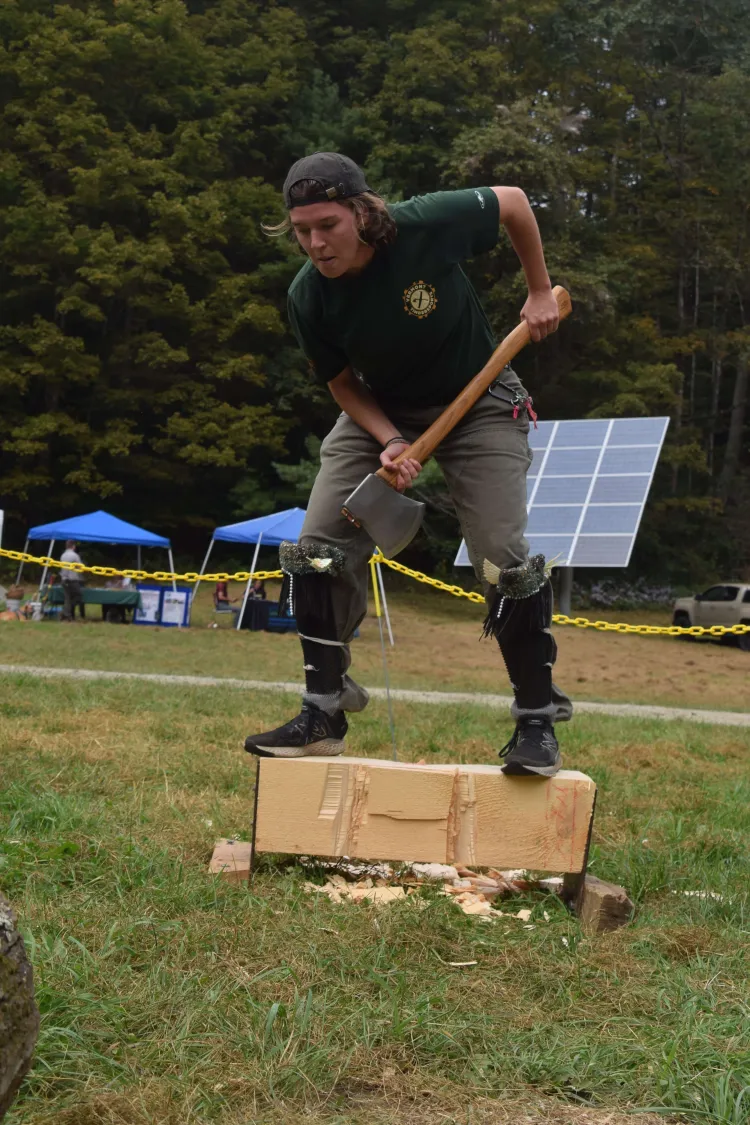
Studying forestry and being on the Timbersports team gave Es innumerable experience and valuable lessons about forestry. But perhaps the most important thing they gained during their time at Rubenstein was self-confidence. “You learn something in class, but I personally did not always feel confident about doing it,” Es explained. “I was nervous about applying it in the real world. So getting out and doing this hands-on work and being able to bounce my ideas off of Jess was great. Looking back at everything I wrote and did is great for my confidence. It’s like, ‘ok, I did it, I can do this.’ That work was so important to me because I love having a challenge to rise up to. It’s the way I learn the best.”
Es encourages younger students who are unsure of what they want to study, but know that they love to be outside, to consider forestry. “Being outside is a very different experience for me now than it was before,” Es explained. “You just know your landscape so much better and you want to know more. If you're curious about the forest, I think it's just such a great thing to study forestry and learn about what's out there and what's around you.” Es also believes that studying forestry has helped them focus their energy and effort away from climate and anxiety and toward meaningful action. “I felt stress around climate change and the environment: what do I do? And forestry has really made me feel like there are tangible things I can do,” Es said. “It's both a thing that gives me hope and something that I feel I can be a part of. When you go into college and you're not sure what you want to do, it's about finding the thing that is right, even if you're not expecting it. Everyone here at Rubenstein and UVM has been so supportive of me, even when I really had no clue what I was doing, or wanted to do. You get so many cool experience here that you're not going to get anywhere else. It’s definitely an experience I wouldn't trade for anything.”
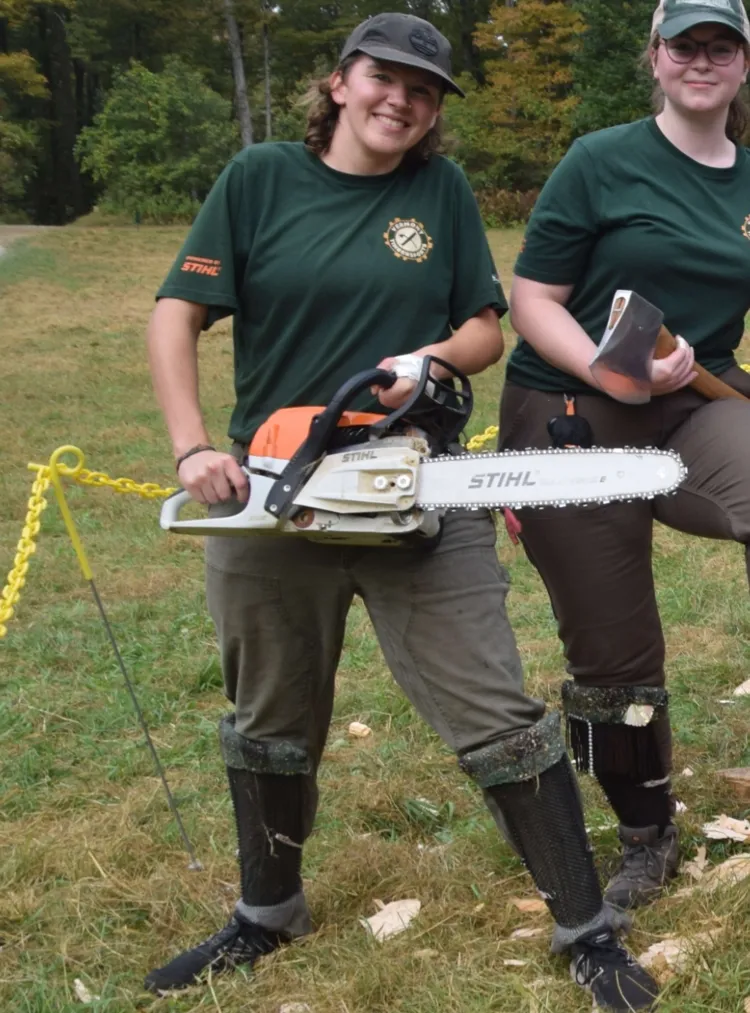
all images courtesy of Es Sweeney
